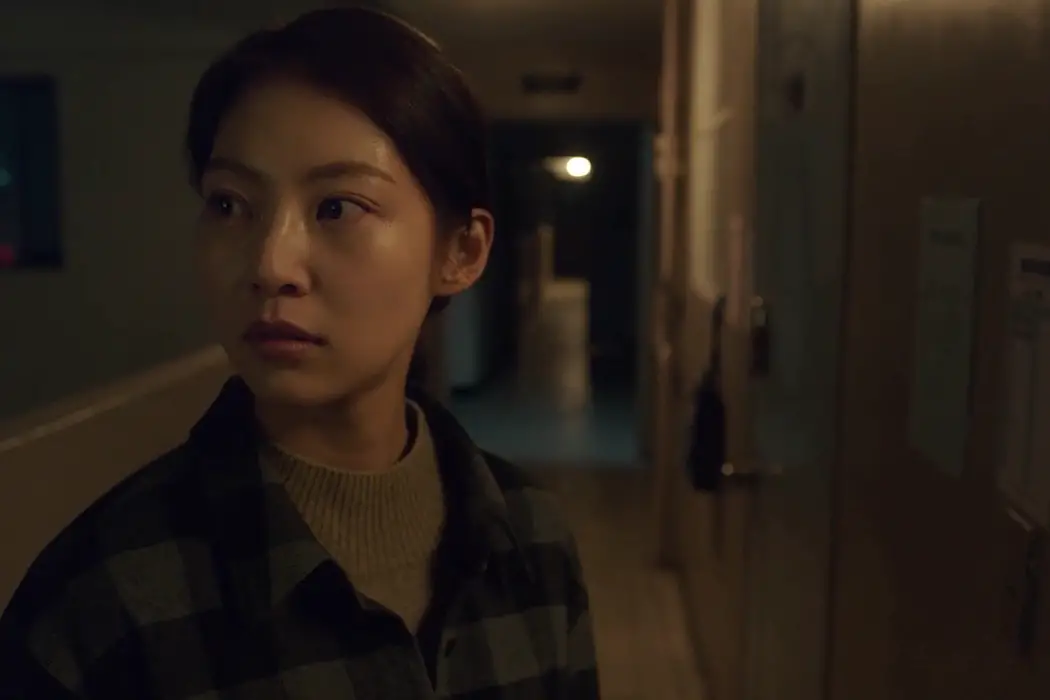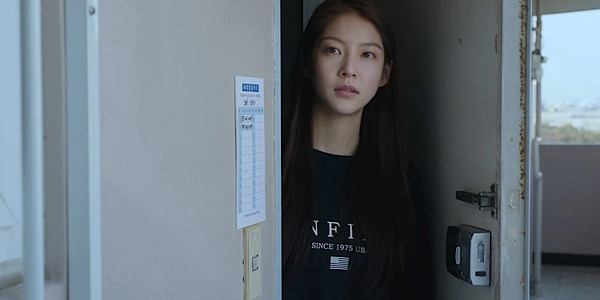TIFF 2021 Report 1: ALONERS, VIOLET & THE HILL WHERE LIONESSES ROAR

Kristy Strouse is the Owner/Editor in Chief of Film Inquiry,…
It’s TIFF 21 time! This year has really blown me away (so far) with the amount of sheer talent and creativity coming through the screen. My first report is filled with three female-directed and debut feature films. All of these different stories, in some way, look at individualism as well as how we interact with others. Each of these features hit me in a way that was personal and yet felt universal. While traversing both of those ideas, I realize that it is what has stuck with me the most, and our ability to connect with others, especially through this wonder of cinema, is a comfort.
Aloners (Hong Sung-eun)

Aloners really has loneliness ingrained in its every movement. Our protagonist Jin-ah (Gong Seung-yeon) doesn’t seem to mind the bubble she has created for herself. She lives alone, keeps to herself at her call center job, and is often on her phone or watching TV. There’s a sense of disconnect from human interaction that teeters on coldness, but – as we learn more – seems to be a defense barrier as much as anything else.
Having recently lost her mother, Jin-ah seems hesitant to connect with her father, and their first few exchanges seem stilted to say the least. When she visits their home she takes the video file from a secret camera inside, which she watches, she sees her mother before she passed, and also her father since. Slowly, as the film moves, we see little kinks in her armor.
“I Prefer to Be Alone”
At work, the responsibility of training a new hire falls on her, something she isn’t excited about. She’s efficient, and anyone messing up her calculated sentiments threatens the individual routine she’s created. From the way she leers at the girl and her general lack of interest towards others, it appears she has settled into it. But is it a matter of a preferred aloneness or a mere resolve and acceptance to that way of life? When her neighbor next door passes away and isn’t found for a week, things take a turn. We often see her walking by the man while he was alive and, as she is with others, she seemed withdrawn and uninterested. He was also someone that kept to himself, and it starts to wear on Jin-ah.
It’s an honest and compelling character study that’s really anchored by Gong Seung-yeon. Her acting tells an entire tale with just her eyes or a hint of devastation as she takes in new details. As her barriers begin to fall, and she comes to some heartbreaking realizations, we can read it all on her face. The screenplay is also sprinkled with moments of levity that seem natural and well-warranted. It’s a real character study on loneliness and what drives us to interact, and it’s one that is especially relevant.
With the current situation, our world is dealing with Aloners felt very relatable, and really highlighted the importance of connection. When the film comes to a close we feel that Jin-ah has a new sense of life. Written and directed by Hong Seong-eun, it marks an impressive new voice in film. It’s a quietly moving film that takes its time, but the tender look at loneliness and isolation is a truly poignant experience. This subtle, but effective vision of loneliness is wholly emotional and relatable, especially now. Featuring a powerful central performance, it marks a stellar directorial debut from Hong Seong-eun. By its end, it offers a sense of hope too.
Violet (Justine Bateman)

As the film starts we meet Violet (Olivia Munn) a film development executive who feels pressured by the weight of her inner voice, branded as “the committee”. We hear these fears and deterrents manifested in a male voice (played by Justin Theroux).
In her work and relationships, Violet often comes across as unassertive, worked down by her own insecurities and lack of self-confidence. At times when the voice is especially adamant, she listens immediately, not realizing that there’s another choice.
This debut by Justine Bateman chooses to flood the image with color when this happens, showing that these inner saboteurs are winning. The film chooses a lot of bold storytelling devices that don’t lean on the idea of subtlety, and it both improves and hinders the overall quality.
Stylish sometimes to a fault, the movie feels occasionally cluttered due to the consistent use of big text on the screen, flashing images (most a little disturbing) and that invasive inner voice. Luckily it still makes room for Olivia Munn to shine as it goes on. The editing really works to make this feel as immersive as possible (we see it from Violet’s perspective), culminating in an interesting and inventive experience.
As the intent of the movie is to really reflect how much our inner demons can keep us from what we really want and becoming our authentic selves, I’m able to look past my initial visual concerns. Many of us are struggling inside but keep a facade of confidence and stability for the world to see. It doesn’t mean we aren’t crumbling beneath the masks we choose to show. That idea is where the strength of this film lies, because it speaks to something we can all relate to.
The energy that’s heightened with its dizzying effect really resonated with me. It requires some patience to start, and it may not be for everyone, but it has a powerful message. The story (which occasionally goes in directions that never bore, but sometimes tempt it) takes place in the male-dominated world of Hollywood, showing the judgment and pressures that build onto her already conquering anxiety. Violet takes us on her journey as she fights for freedom, from thought and societal and familial pressures, and her worst critic: herself.
Justine Bateman, writes and directs a compelling and stylish feature that wavers on excessive, but ultimately reins it in enough to prove to be an enthralling story. Olivia Munn gives the best performance of her career. A film that immerses you in the lead’s inner thoughts and fears with real flair – and an amazing performance by Olivia Munn – that is occasionally overwhelming (borderline exhausting) but with a sincerity that ultimately wins out.
The Hill Where Lionesses Roar (Luàna Bajrami)

While each of the girls in this film have their own individual story and struggles, the portrayal of their friendship and kinship is what really thrives, and makes it flourish. Qe (Flaka Latifi), Li (Era Balaj), and Jeta (Urate Shabani) play the three best friends at the center of the story and their perpetual cage, in Kosovo. They decide to take on their liberation together, and that’s where the Lionesses truly begin to roar.
It captures the adventures of youth and often the desire/need for more, which can complicate an already challenging time. As they yearn for freedom, we discover what these girls are up to, and how far they’ll really go to shake themselves from this oppressive environment.
The Hill Where Lionesses Roar is beautifully filmed, with the use of natural light, and the scenery shot by Hugo Paturel displayed wonderfully. There’s a real ferocity that manifests itself from its powerful performances to the stunning cinematography. In many scenes, especially early on before we fully know our characters, you can feel the sunshine in each shot, and the world that surrounds them, wild and urging them to break out. That’s what they really want, to shake the confines of their country town.
As a snapshot of fiery female youth and of the strength and independence of women, the film is often marred by an undeveloped script. It may occasionally feel uneven, but it doesn’t lose its overarching themes or stifle the spark of this talented young cast. In many ways, this film works as a perfect starter film for a new and promising director. The coming of age story isn’t necessarily breaking new ground, nor is their decision to eventually rebel- surprising, but those parts can be overlooked. In many ways, these aspects are expected, because there’s a level of truth behind it: you can’t keep a wild spirit tamed forever.
The fact that this is a directorial debut by the young and talented Luàna Bajrami (who starred as Sophie in Céline Sciamma’s gorgeous Portrait of a Lady on Fire) makes the feat even more impressive. It’s a story that takes a while to gather its audience, but never loses its honesty or its intent to be as visceral as its wild title sounds. Beautifully shot, bursting with young talent, but occasionally lacking in momentum, The Hill Where Lionesses Roar marks a promising debut from Luàna Bajrami.
Does content like this matter to you?
Become a Member and support film journalism. Unlock access to all of Film Inquiry`s great articles. Join a community of like-minded readers who are passionate about cinema - get access to our private members Network, give back to independent filmmakers, and more.
Kristy Strouse is the Owner/Editor in Chief of Film Inquiry, writer, podcaster, and all around film and TV fanatic. She's also VP of Genomic Operations at Katch Data and is a member of The Online Association of Female Film Critics and The Hollywood Creative Alliance. She also has a horror website: Wonderfully Weird & Horrifying.













